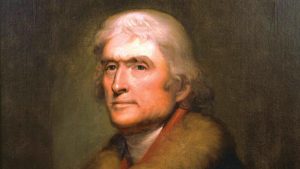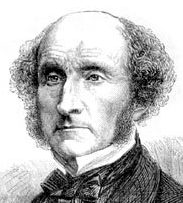We live in interesting times. They are times of uncertainty and danger. They are times that threaten our core principles of freedom and the fabric of our society. It is time to make a defense of free thought.
Illiberalism and a Defense of Free Thought
A growing tide of illiberalism surrounds us from both sides of the political spectrum. An illiberalism that burns in our hearts, that forces us further apart. An illiberalism that seers our conscience and spreads through our communities. Some on the right lead it. They promote social inequalities and class vitriol that threaten the left. Some on the left also lead it. They repudiate tolerance and free expression and seek to muzzle and silence those with whom they disagree. Both sides seek to use government – force – to impose their views on others. Both are unwilling to lay down their arms and compete in the open marketplace of ideas.

Our First Amendment mandates that Congress shall make no law abridging the freedom of speech. It set the boundaries for restrictions that government may impose on speech and thought. But our Constitution cannot mandate what we the people think. It cannot mandate what we the people say. The Constitution cannot force tolerance on we the people, or any one of us or prevent us from being intolerant. It cannot require us to love, or prevent us from hate.
We Must Choose Defense of Free Thought – Or Risk Losing It
We the people must choose. Do we cherish or despise each other for our different views? Must we all go to the same church, or will we allow that our strength lies in our many different churches? Can we share our thoughts without fear of recrimination? Or should we allow that our neighbors may shun us, and employers may terminate us, if they disagree?
Perhaps western philosophy’s greatest contribution is liberalism. The traditions of free thought and free expression that have become the bedrock of our way of life. But the enemies of liberalism block its path forward. They would destroy it. Public expression is met with physical violence. Every published word is seemingly monitored by thought police, ready to pounce with social ostracism or physical violence on those with whom they disagree.
Our media no longer reports. It promotes and it advocates. And it attacks, sometimes with venom, but more times with guile. The media bickers and it disingenuously argues. We the people have lost faith in these voices, few of whom are aware that they simply tear down our communities. And yet fewer of them who remember that we are all countrymen during this one small moment of life.
We sacrifice our civility and our decency at the altar of self-righteousness and contemptuousness. Physical confrontation increasingly becomes the norm of behavior in the face of those with differing voices. Verbal violence is met with verbal violence, and we tear at our very souls.
Are we stronger for those who prevent access to speakers whom they abhor? Are we made freer by those who virulently attack the very notion of thoughts, views, or philosophies that differ from their own? Is our freedom now imperiled by our universities, who once demanded diversity in thought but now lecture to one side and deprecate and demean the other?
Should we muzzle those with whom we disagree? Should we ridicule them? Do we need secret thought monitors. Should we tolerate and even promote social mores that bring public shame to those with whom we disagree?
Defense of Free Thought – Our Road Back
It’s time to relearn our lessons. To look ourselves in the eye and remind ourselves where we came from, and the reasons that so many sacrificed to preserve our way of life. So we suggest a Bill for Preserving Free Thought. We declare that the rights set forth in our bill are the natural rights of mankind.
The Twelve Premises for Preserving Freedom of Thought
A defense of free thought starts with a foundation. Accordingly, we rely on these principles as the foundations for preserving freedom of thought.
Section I. The Twelve Premises. Well aware that:
- The opinions and beliefs of men depend not on their own will, but follow the evidence proposed to their minds.
- Our minds are created free, and free they shall remain by making them insusceptible of restraints.
- All attempts to influence our thoughts by punishments or burdens tend only to create habits of hypocrisy and meanness.
- Our thoughts shall not be coerced.
- The thoughts and opinions of others, who themselves are fallible and who maintain their own opinions and modes of thinking as the only true and infallible ones, shall not be imposed on those with whom they disagree.
- To compel a man to propagate opinions which he disbelieves and abhors is tyrannical. To force him to support a viewpoint different than his own deprives him of the comfortable liberty of supporting such opinions whose morals he would freely choose.
- Our civil rights are not dependent on our opinions.
- No person shall be seen as unworthy of public confidence and prevented from service in positions of public trust because he professes or renounces this or that opinion. To do so deprives him of those privileges and advantages to which, in common with his fellow citizens, he has a natural right. It tends also to corrupt the principles that freedom of thought encourage.
- The opinions of men are not the object of civil government, nor under its jurisdiction.
- To suffer other men to intrude their powers into the field of opinion, and to restrain the profession or propagation of principles on supposition of their ill tendency, are dangerous fallacies. They at once destroy all freedom of thought, because such men being judge of that tendency will make their opinions the rule of judgment, and approve or condemn the sentiments of others only as they shall square with or differ from their own.
- It is the rightful purposes of government for its officers to interfere when principles break out into overt acts against free thought.
- Truth is great and will prevail if left to herself. Truth is the proper and sufficient antagonist to error. Trust has nothing to fear from the conflict unless disarmed by human interposition of the natural weapons of free argument and debate. Errors are not dangerous when truth is free to contradict them.

The Four Pillars For Preserving Freedom of Thought
We now embed our defense of free thought in the following proscriptions.
Section II. The Four Proscriptions. We the People accordingly provide that:
- No person shall be compelled to possess, or refrain from possessing, any thought, philosophy or viewpoint.
- Nor shall any person have imposed upon him by physical or verbal force or intimidation any thought, philosophy or viewpoint.
- No person shall otherwise suffer or endure physical or social abuse on account of his opinions or beliefs.
- All men shall be free to profess, and by argument to maintain, their opinions in matters of religion, politics, philosophy, or any other concepts, and that the same shall in no wise diminish, enlarge, or affect their civil rights, including but not limited to their right to gainful employment and public expression.
Our Pillars for Preserving Free Thought – A Gift From the Past
We take no credit for these prescriptions. A defense of free thought must be a defense best made. These prescriptions were bequeathed from our past. For they are the gift of Thomas Jefferson, borrowed from his 1777 Draft of a Bill for Religious Freedom. They are the principles that guided his time. And that must guide our own.
What do you think?

